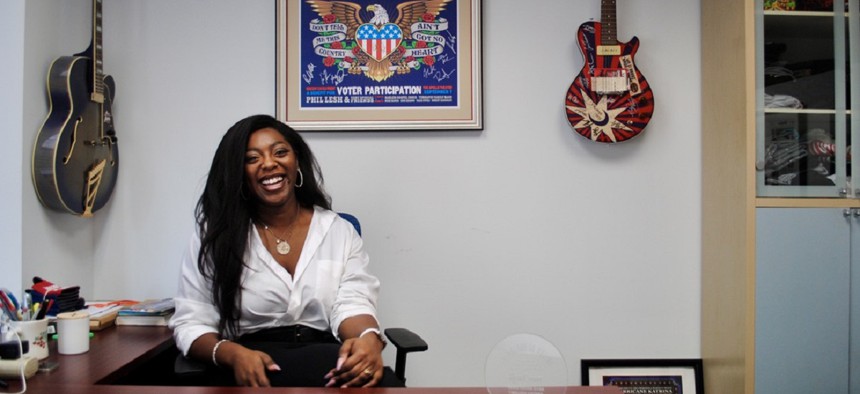Nonprofits
HeadCount celebrates 20 years with new leadership
Lucille Wenegieme, the nonprofit’s new executive director, takes on voter registration.

Lucille Wenegieme is the new executive director of HeadCount. Hannah Berman
As the voter registration nonprofit HeadCount celebrates its 20th anniversary in 2024, the organization is changing up its leadership. Lucille Wenegieme, a first-generation Nigerian American with a background in political advocacy, is the organization's new executive director, taking over for co-founder Andy Bernstein. Bernstein and bassist Marc Brownstein founded HeadCount in 2004 to convince young Americans to participate in the democratic process.
Eighteen- to 29-year-olds are a notoriously difficult demographic to get involved in civic life. So Bernstein and Brownstein decided to bring voter registration into spaces where youth already spent their time – concert halls and music festivals, primarily – to encourage democratic participation without preaching about who to vote for. HeadCount, instead, mobilizes volunteers to talk to young people and encourage music fans to vote. The organization also has worked with artists ranging from the Grateful Dread to Jay-Z to Billie Eilish, to get the word out. The non-partisan effort, with the help of 60,000 volunteers across the country, has gotten 1.25 million people registered to vote.
Wenegieme comes to this advocacy work from an unexpected career track. Encouraged by her parents to become a doctor, she studied cell biology as an undergrad. She later received a master’s degree in medical science. However, deciding she did not want to go to medical school, she instead sidestepped into the fashion world and leaned into communications.
“I started working at Coach and it was right when they were starting to take influencer marketing seriously,” she said. “By being one of the youngest people in the room, I got kind of thrown into that, and I loved it.”
Soon after, Wenegieme realized she could be doing the same type of communications work in the civic space, and began advising civic organizations at a small communications firm in Colorado. Her passion for democracy led her to the National Vote at Home Institute, where she was vice president of communications. She also landed a seat on the board at HeadCount, which is how she was eventually tapped to lead the organization. According to Wenegieme, HeadCount’s non-partisanship is one of the keys to its success.
“Our interactions are directly with music fans, and most of those interactions are in-person, at shows, concerts, festivals, and community events,” she said. “It's so much easier to make that overture when you're able to say, ‘I don't have an agenda here. My agenda is just to give you information.’ Especially because young people, who tend to be our focus, they can see through the BS.”
HeadCount historically has partnered with a variety of artists, but with a particular focus on the jam band community. The organization has a longtime relationship with artists like Bob Weir of the Grateful Dead, and festivals like LOCKN’ that cater to jam fans. Moving forward, however, Wenegieme aims to diversify HeadCount’s focus.
“Young people today are listening across genre,” she said. “There are music fans that need to be engaged in democracy that listen to Latin music, country music, hip hop, or K-pop, and these are genres that we haven't embraced. That's definitely a new thing that I'm focusing on for 2024 — meeting all music fans, and finding them a civic home.”
Wenegieme dreams of partnering with artists like Bad Bunny and Hozier, who she notes are fellow immigrants, to activate new populations that HeadCount has not been able to reach. While there are exciting new things on the horizon, she still plans on staying true to the roots of the organization, which she says would not be possible without its strong, dedicated volunteer base.
“In your free time, when you can be doing anything else in the world – hugging your kids, trying a new restaurant, whatever – we're asking you to show up and participate,” she said. “And our volunteers do it so often for us and with us, and we're asking young people to do it for themselves and for their communities … We're at 60,000 [volunteers], which is a huge number. It’s stadiums of people who regularly give their time and their energy. That's so special to me.”
As she steps into this role, Wenegieme aims to expand the volunteer base even further. Since 2024 is such a big election year, she is also thinking deeply about what activating young people to vote can look like when they’re largely unenthused by both options at the top of the ballot.
“Elections are not just every four years; every year there's an election,” Wenegieme said. “Really, on any given Tuesday, depending on where you live, there's an election. So [it’s about] really engaging young people and saying, ‘This isn't just about the folks at the top of the ticket. This is also about local races, and some of those local races are where your community – the people that you live with, your neighbors, your friends, your family – are the most affected.’”
